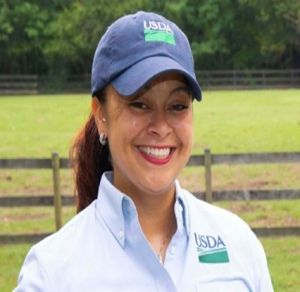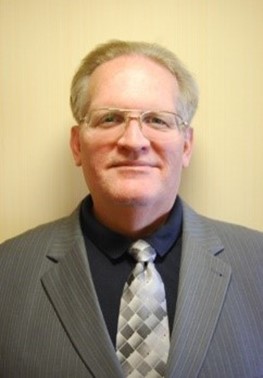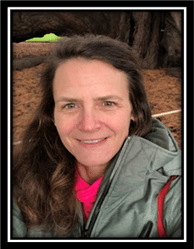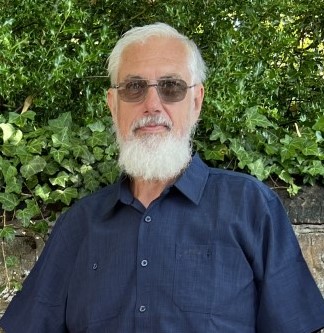Executive Board

President
Rachel Cezar, DVM, MSU, 2002
(2023 and 2024)
Dr. Rachel Cezar-Martinez was elected in 2021 to be the incoming President of the National Association of Federal Veterinarians (NAFV) for 2023 and 2024. She has been a dedicated member of the NAFV for the last 20 years serving in multiple different committees and board positions.
Dr. Cezar-Martinez currently serves as the USDA APHIS Area Veterinarian in Charge (AVIC) of MS and LA. Previously she was director of live animal imports in the Washington DC area. She has been with USDA APHIS since 2004 in different leadership arenas of Animal Care, Veterinary Services, and Civil Rights/EEO. Therefore, Dr. Cezar-Martinez enjoys promoting the array of USDA career opportunities as well as supporting the retention and recruitment of veterinarians to the federal workforce.
Since starting her career as a veterinarian in 2002 after graduating from Michigan State University, Dr. Cezar-Martinez has strived to be a leader in the overall veterinary profession in which just to name a few…she has served as founder of the Multicultural Veterinary Medical Association (MCVMA), Executive Director of DCVMA and President of WVLDI.
Currently, she serves on the diversity and nominating committees for the American Association of Equine Practitioners (AAEP) and the AVMA house of delegates representing the NAFV.
Along with her dedication as a public servant and veterinary medicine, she, fortunately, has a supportive husband, Dennis, that works for the American Horse Council, and two young kids, Zaiden and Zoey aka Bubba and Sister that are preparing to be in 4-H and FFA to continue the Creole and Hispanic cowboy and farming tradition of their grandparents from Southwest Louisiana and El Salvador.
Dr. Cezar-Martinez is extremely excited to serve as NAFV president for 2023 and 24. As always she has an open door so please feel free to reach out to her at drrachelcezar@gmail.com or rachel.cezar-martinez@usda.gov.
Secretary- Treasurer
John Sanders, DVM, ACVPM
(2023 and 2024)
Dr. John Sanders (DHS Workforce Help) is a Veterinary Medical Officer in the Department of Homeland Security's (DHS) Workforce Health. He is responsible for providing veterinary medical for DHS working dogs and horses. He also provides information on emerging zoonotic diseases to protect DHS frontline workforce. Dr. Sanders holds a Doctor of Veterinary Medical Degree from the University of Tennessee, and a Master of Exercise Practitioner designation from the Federal Emergency Management Agency's Emergency Management Institute.
Dr. Sanders' 33-year career in government has spanned four agencies across three departments: U.S. Department of Agriculture's Food Safety and Inspection Services (USDA-FSIS), the USDA's Animal and Plant Health Inspection Service (USDA-APHIS), Health and Human Services' Food and Drug Administration (HHS-FDA), and DHS' Office of Health Affairs (OHA).
His past leadership includes serving as the Vice Chair, and then the Chair for the U.S. Animal Health Organization's Public Health and Rabies committee from 2001-2002 and then 2003-2008 respectively, and he has served in many positions with NAFV including Secretary-Treasurer on the 2013-2014 Board.
Dr. Sanders has received over 40 awards for his work on veterinary issues. In 2008, he received the Helwig-Jennings Award and in 2016 received 2016 ACVPM DISTINGUISHED DIPLOMATE AWARD from the American College of Veterinary Preventive Medicine.


President-Elect
Leah Trapp MS, DVM, DACVPM
(2025-2026)
Dr. Trapp is a 2003 graduate of Colorado State University College of Veterinary Medicine and Biomedical Science. She served three years on active duty for the U.S. Army upon graduation and later joined the Army Reserves. Her Army service includes leadership positions serving as a veterinary clinic section chief, a civil affairs battalion headquarters and headquarters company commander, and civil affairs public health section chief on two separate deployments to the Horn of Africa. She’s worked with various governments, NGOs, and the UN’s Food and Agriculture Organization throughout the Horn of Africa. After active duty, Dr. Trapp worked in private practice and ran her own relief veterinary service before joining APHIS VS in 2008 as an export Veterinary Medical Officer where she began an initiative to improve the efficiency of handling international pet health certificates. In 2009 she was mobilized to serve in Germany at the Grafenwoehr military base. At the end of her tour, she accepted an offer to serve as the full-time civilian veterinarian at the same clinic and remained in Germany until 2015.
In 2016, Dr. Trapp graduated with a Master of Peace Operations Policy from George Mason University. After graduation, she once again joined APHIS VS serving as a field Veterinary Medical Officer in Washington State where she continues her employment. She is currently pursuing her Master of Public Health and is only two credits from graduation in Spring 2023. She is the area aquaculture liaison and One Health Coordinator remaining active in various related working groups. Her familiarity with policy, governance and collective bargaining from when she was a member of the Association of Flight Attendants in the 1990s makes her an ideal candidate with a broad range of experiences who understands how to work in administratively challenging environments.
Executive Vice-President
Joseph Annelli DVM, MS
Dr. Joseph Annelli is a former USDA, Animal and Plant Health Inspection Service Veterinary Services Senior Advisor for Agriculture and Health System (One Health Coordinator) and Director of the One Health Coordination Center. He retired this past January after a 32-year career covering a broad range of policy and program development to start his own consulting company “Practical One Health Solutions”.
A native of New York, Dr. Annelli received a BS in Biology in 1976 from St. Francis College in Brooklyn, NY, and a MS in Zoology with an emphasis on Oceanography and Wildlife Management from the C.W. Post Campus of Long Island University. He received his Doctor of Veterinary Medicine at Del La Salle Araneta University in Quezon City, Philippines in 1983 after completing his senior year of clinical practice at the University of Tennessee College of Veterinary Medicine.
Throughout his 32 year federal career he was (and still is) an innovative thinker and one who pushed the needle forward with things like eradicating avian influenza from the live bird market system in NYC, eradicating pseudorabies from the US domestic swine herds, introducing the Incident Command System to Veterinary Services, building the APHIS EOC, building emergency programs activities from being a second thought to a world class response organization. He managed USDA’s engagement in the White House’s Avian and Pandemic Influenza Preparedness implementation plan while on detail to the USDA Secretary’s Office, leading the USDA International Avian and Pandemic Influenza Response Team, developing a Crisis Management Center at the Food and Agriculture Organization in Rome, leading USDA on Global Health Security at the White House, initiating the USDA wide One Health Joint Working Group, the Federal Interagency One Health Working Group, and finally founding and leading the USDA One Health Coordination Center.
Dr. Annelli sees the biggest challenge for Public Practice Veterinarians and One Health in general the lack of acknowledgement that agriculture and animal health really are the first line of defense for human health. Often times, animal health agencies are considered Livestock agencies limited to animal health and animal welfare. But if you take a step back, you’ll see that the true role is to ensure that agriculture provides wholesome, abundant, affordable food for the US and the World. When I say “wholesome,” it’s encompasses food that is nutritionally rich and rid a of disease, and while the programs may be focused on animals, ultimately they are ensuring human health. For example, when dealing with rabies, we develop animal vaccines, yes, but if we were to focus on developing human vaccines, we’d only be addressing a symptom of the problem and not the root cause itself—rabies.
Today, Dr. Annelli continues to advance the cause of One Health. Post retirement, he has started a consulting business called “Practical One Health Solutions” and has been consulting with the World Health Organization on the development of a Zoonotic Disease Guide and has pulled together a global consortium to submit a proposal on measuring countries National AMR Action Plans, influencing Congress to include One Health in the Pandemic and All Hazards Preparedness Act to name a few. And more recently advocating for the “Advancing Emergency Preparedness through One Health Act” a bicameral bipartisan Bill introduced into the US Congress this year.
Dr. Annelli joined NAFV in 1986 and remained a lifelong member since then. He was recruited to take on the role of Executive Vice President in 2019 and expanded communications with members, redesigned the website and added member benefits and training opportunities. He continues to expand member engagement with a new membership management database, website and a mobile app to access a member directory and forum discussions.

